Investigating Talent Management Impact on Employee Performance
VerifiedAdded on 2023/06/17
|14
|3299
|484
Report
AI Summary
This report investigates the impact of talent management on employee performance within Imaginera Ltd, a UK-based software development SME. It begins with a literature review exploring various perspectives on talent management, including its role in attracting, retaining, and developing employees. The report then details the research methods used, focusing on an inductive approach and interpretivism philosophy, employing both primary (questionnaires) and secondary data collection. A questionnaire was administered to Imaginera employees, and the data was analyzed thematically. Key findings indicate that most employees are aware of talent management concepts and that skills and knowledge development workshops are a prevalent practice. The analysis also reveals that talent management practices are generally perceived to recognize employee strengths and weaknesses. The report concludes by discussing alternative methods and suggesting strategies for improving talent management practices to enhance employee performance. Desklib provides access to this document and many more resources for students.
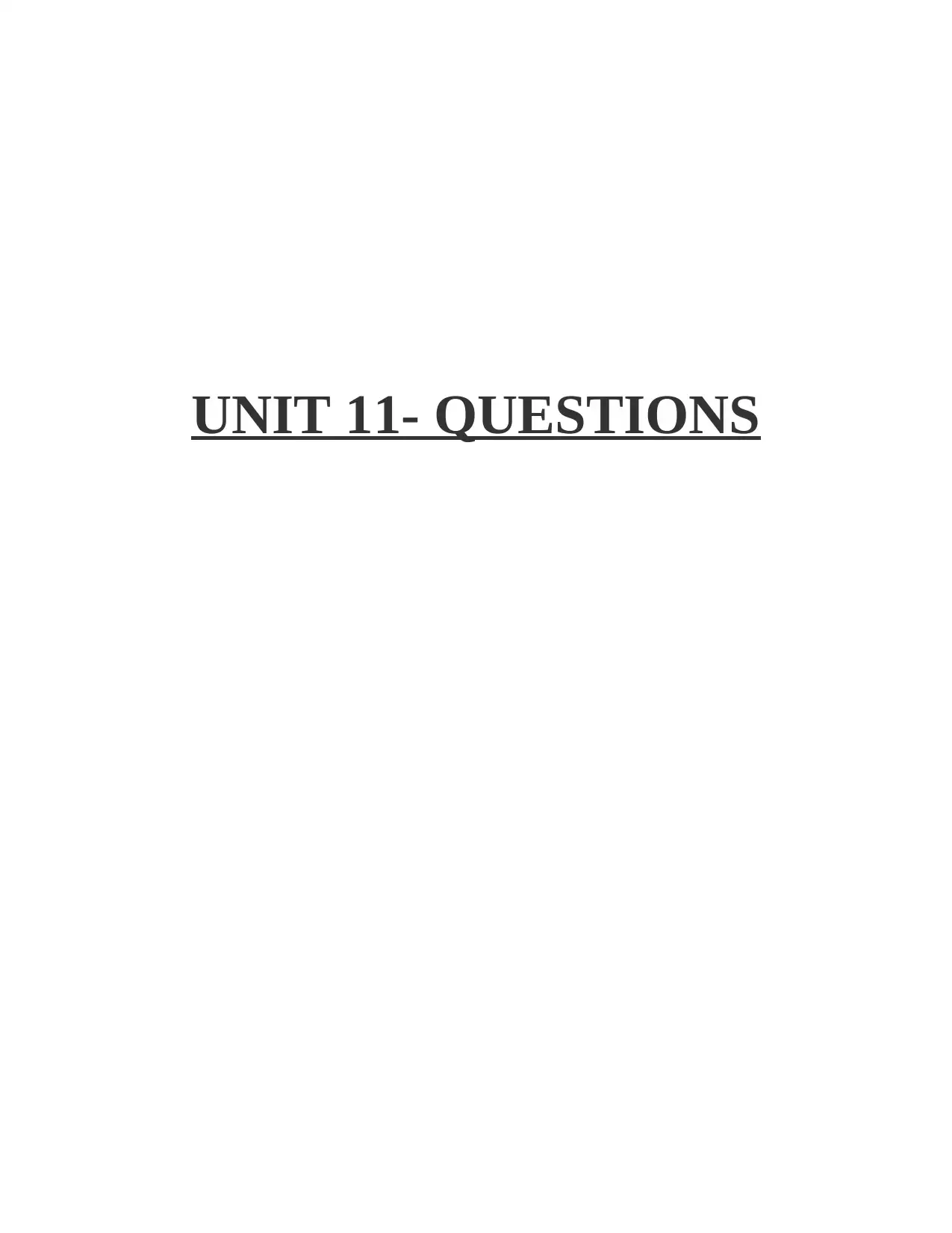
UNIT 11- QUESTIONS
Paraphrase This Document
Need a fresh take? Get an instant paraphrase of this document with our AI Paraphraser
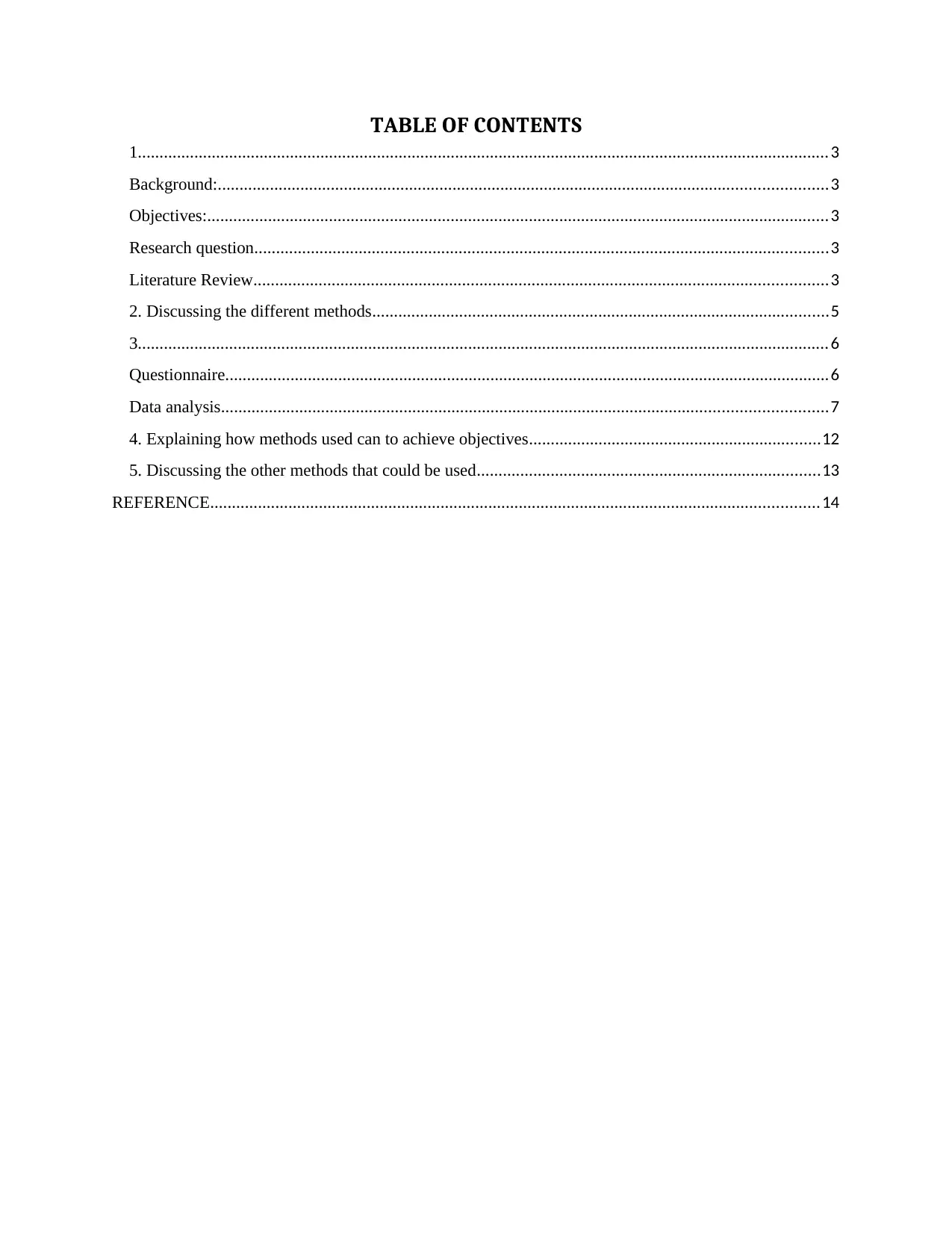
TABLE OF CONTENTS
1...............................................................................................................................................................3
Background:............................................................................................................................................3
Objectives:...............................................................................................................................................3
Research question....................................................................................................................................3
Literature Review....................................................................................................................................3
2. Discussing the different methods.........................................................................................................5
3...............................................................................................................................................................6
Questionnaire...........................................................................................................................................6
Data analysis...........................................................................................................................................7
4. Explaining how methods used can to achieve objectives...................................................................12
5. Discussing the other methods that could be used...............................................................................13
REFERENCE............................................................................................................................................14
1...............................................................................................................................................................3
Background:............................................................................................................................................3
Objectives:...............................................................................................................................................3
Research question....................................................................................................................................3
Literature Review....................................................................................................................................3
2. Discussing the different methods.........................................................................................................5
3...............................................................................................................................................................6
Questionnaire...........................................................................................................................................6
Data analysis...........................................................................................................................................7
4. Explaining how methods used can to achieve objectives...................................................................12
5. Discussing the other methods that could be used...............................................................................13
REFERENCE............................................................................................................................................14
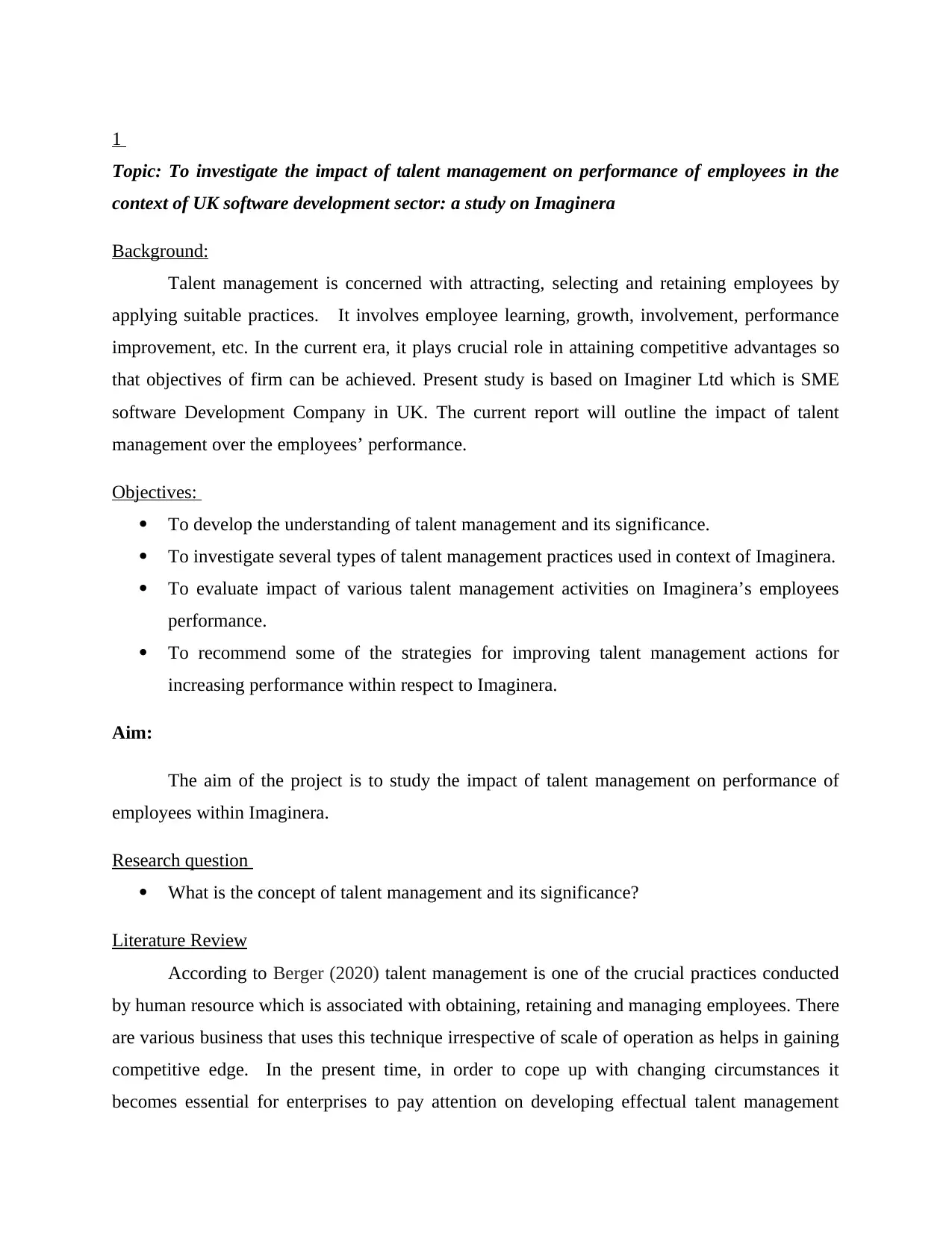
1
Topic: To investigate the impact of talent management on performance of employees in the
context of UK software development sector: a study on Imaginera
Background:
Talent management is concerned with attracting, selecting and retaining employees by
applying suitable practices. It involves employee learning, growth, involvement, performance
improvement, etc. In the current era, it plays crucial role in attaining competitive advantages so
that objectives of firm can be achieved. Present study is based on Imaginer Ltd which is SME
software Development Company in UK. The current report will outline the impact of talent
management over the employees’ performance.
Objectives:
To develop the understanding of talent management and its significance.
To investigate several types of talent management practices used in context of Imaginera.
To evaluate impact of various talent management activities on Imaginera’s employees
performance.
To recommend some of the strategies for improving talent management actions for
increasing performance within respect to Imaginera.
Aim:
The aim of the project is to study the impact of talent management on performance of
employees within Imaginera.
Research question
What is the concept of talent management and its significance?
Literature Review
According to Berger (2020) talent management is one of the crucial practices conducted
by human resource which is associated with obtaining, retaining and managing employees. There
are various business that uses this technique irrespective of scale of operation as helps in gaining
competitive edge. In the present time, in order to cope up with changing circumstances it
becomes essential for enterprises to pay attention on developing effectual talent management
Topic: To investigate the impact of talent management on performance of employees in the
context of UK software development sector: a study on Imaginera
Background:
Talent management is concerned with attracting, selecting and retaining employees by
applying suitable practices. It involves employee learning, growth, involvement, performance
improvement, etc. In the current era, it plays crucial role in attaining competitive advantages so
that objectives of firm can be achieved. Present study is based on Imaginer Ltd which is SME
software Development Company in UK. The current report will outline the impact of talent
management over the employees’ performance.
Objectives:
To develop the understanding of talent management and its significance.
To investigate several types of talent management practices used in context of Imaginera.
To evaluate impact of various talent management activities on Imaginera’s employees
performance.
To recommend some of the strategies for improving talent management actions for
increasing performance within respect to Imaginera.
Aim:
The aim of the project is to study the impact of talent management on performance of
employees within Imaginera.
Research question
What is the concept of talent management and its significance?
Literature Review
According to Berger (2020) talent management is one of the crucial practices conducted
by human resource which is associated with obtaining, retaining and managing employees. There
are various business that uses this technique irrespective of scale of operation as helps in gaining
competitive edge. In the present time, in order to cope up with changing circumstances it
becomes essential for enterprises to pay attention on developing effectual talent management
⊘ This is a preview!⊘
Do you want full access?
Subscribe today to unlock all pages.

Trusted by 1+ million students worldwide
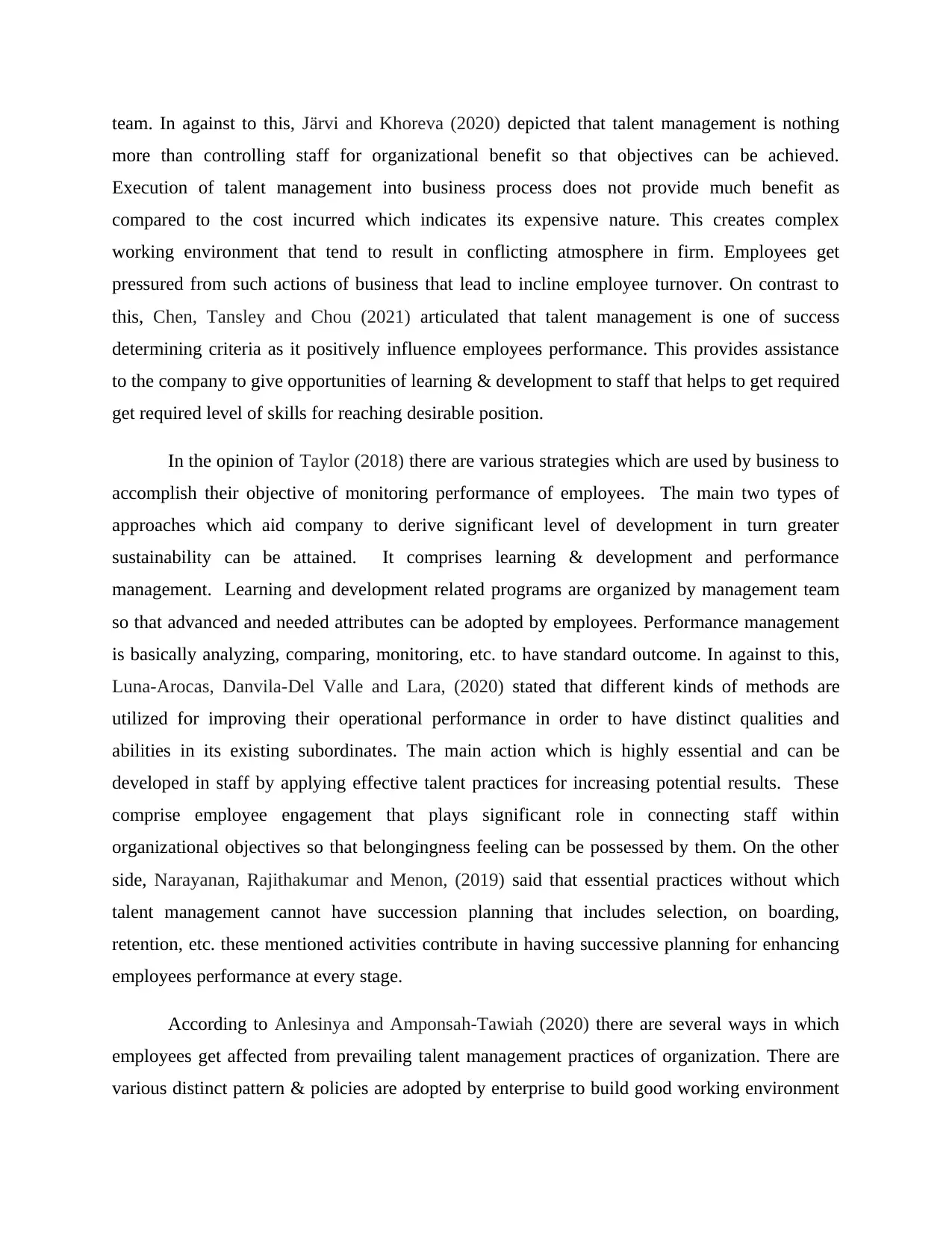
team. In against to this, Järvi and Khoreva (2020) depicted that talent management is nothing
more than controlling staff for organizational benefit so that objectives can be achieved.
Execution of talent management into business process does not provide much benefit as
compared to the cost incurred which indicates its expensive nature. This creates complex
working environment that tend to result in conflicting atmosphere in firm. Employees get
pressured from such actions of business that lead to incline employee turnover. On contrast to
this, Chen, Tansley and Chou (2021) articulated that talent management is one of success
determining criteria as it positively influence employees performance. This provides assistance
to the company to give opportunities of learning & development to staff that helps to get required
get required level of skills for reaching desirable position.
In the opinion of Taylor (2018) there are various strategies which are used by business to
accomplish their objective of monitoring performance of employees. The main two types of
approaches which aid company to derive significant level of development in turn greater
sustainability can be attained. It comprises learning & development and performance
management. Learning and development related programs are organized by management team
so that advanced and needed attributes can be adopted by employees. Performance management
is basically analyzing, comparing, monitoring, etc. to have standard outcome. In against to this,
Luna-Arocas, Danvila-Del Valle and Lara, (2020) stated that different kinds of methods are
utilized for improving their operational performance in order to have distinct qualities and
abilities in its existing subordinates. The main action which is highly essential and can be
developed in staff by applying effective talent practices for increasing potential results. These
comprise employee engagement that plays significant role in connecting staff within
organizational objectives so that belongingness feeling can be possessed by them. On the other
side, Narayanan, Rajithakumar and Menon, (2019) said that essential practices without which
talent management cannot have succession planning that includes selection, on boarding,
retention, etc. these mentioned activities contribute in having successive planning for enhancing
employees performance at every stage.
According to Anlesinya and Amponsah-Tawiah (2020) there are several ways in which
employees get affected from prevailing talent management practices of organization. There are
various distinct pattern & policies are adopted by enterprise to build good working environment
more than controlling staff for organizational benefit so that objectives can be achieved.
Execution of talent management into business process does not provide much benefit as
compared to the cost incurred which indicates its expensive nature. This creates complex
working environment that tend to result in conflicting atmosphere in firm. Employees get
pressured from such actions of business that lead to incline employee turnover. On contrast to
this, Chen, Tansley and Chou (2021) articulated that talent management is one of success
determining criteria as it positively influence employees performance. This provides assistance
to the company to give opportunities of learning & development to staff that helps to get required
get required level of skills for reaching desirable position.
In the opinion of Taylor (2018) there are various strategies which are used by business to
accomplish their objective of monitoring performance of employees. The main two types of
approaches which aid company to derive significant level of development in turn greater
sustainability can be attained. It comprises learning & development and performance
management. Learning and development related programs are organized by management team
so that advanced and needed attributes can be adopted by employees. Performance management
is basically analyzing, comparing, monitoring, etc. to have standard outcome. In against to this,
Luna-Arocas, Danvila-Del Valle and Lara, (2020) stated that different kinds of methods are
utilized for improving their operational performance in order to have distinct qualities and
abilities in its existing subordinates. The main action which is highly essential and can be
developed in staff by applying effective talent practices for increasing potential results. These
comprise employee engagement that plays significant role in connecting staff within
organizational objectives so that belongingness feeling can be possessed by them. On the other
side, Narayanan, Rajithakumar and Menon, (2019) said that essential practices without which
talent management cannot have succession planning that includes selection, on boarding,
retention, etc. these mentioned activities contribute in having successive planning for enhancing
employees performance at every stage.
According to Anlesinya and Amponsah-Tawiah (2020) there are several ways in which
employees get affected from prevailing talent management practices of organization. There are
various distinct pattern & policies are adopted by enterprise to build good working environment
Paraphrase This Document
Need a fresh take? Get an instant paraphrase of this document with our AI Paraphraser
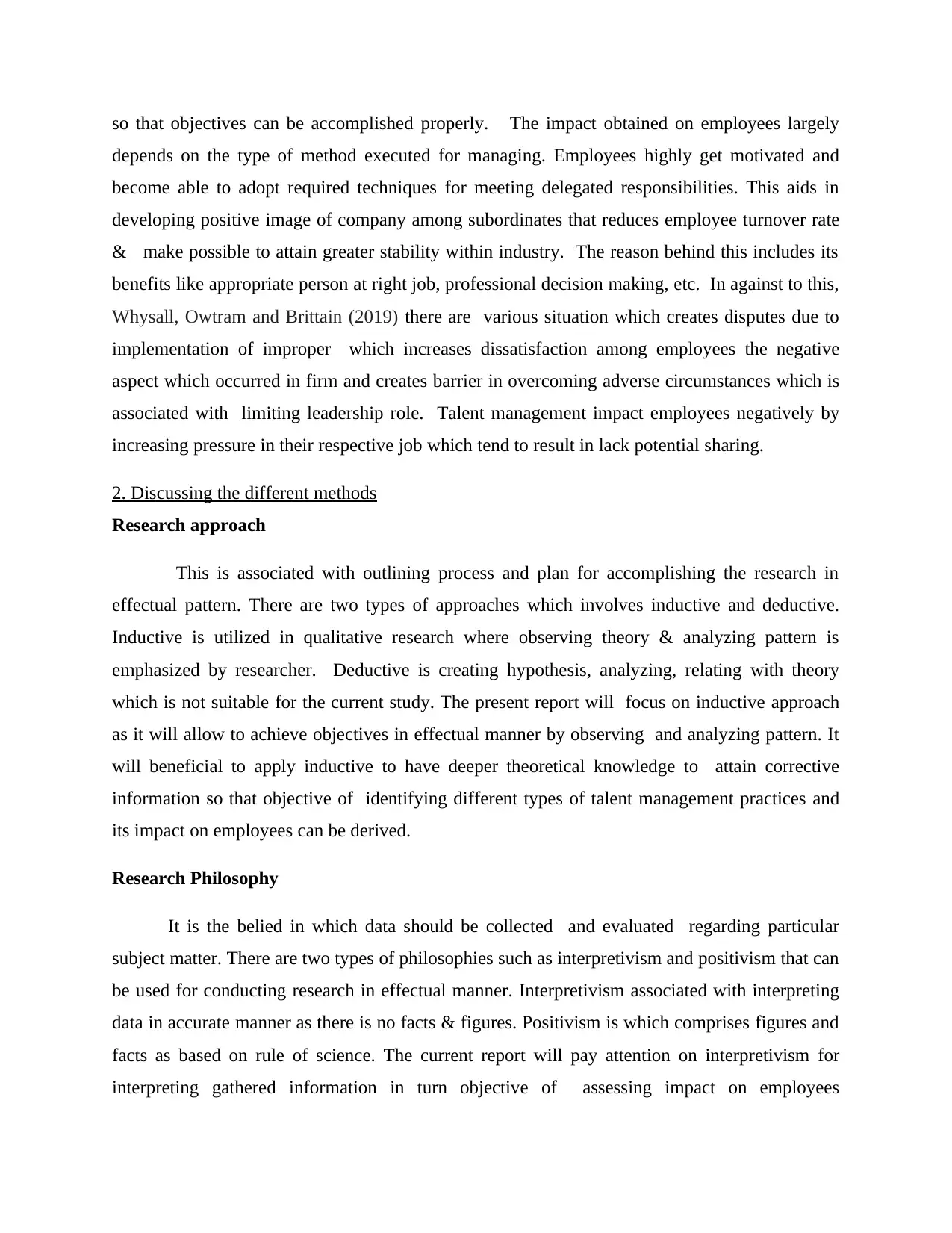
so that objectives can be accomplished properly. The impact obtained on employees largely
depends on the type of method executed for managing. Employees highly get motivated and
become able to adopt required techniques for meeting delegated responsibilities. This aids in
developing positive image of company among subordinates that reduces employee turnover rate
& make possible to attain greater stability within industry. The reason behind this includes its
benefits like appropriate person at right job, professional decision making, etc. In against to this,
Whysall, Owtram and Brittain (2019) there are various situation which creates disputes due to
implementation of improper which increases dissatisfaction among employees the negative
aspect which occurred in firm and creates barrier in overcoming adverse circumstances which is
associated with limiting leadership role. Talent management impact employees negatively by
increasing pressure in their respective job which tend to result in lack potential sharing.
2. Discussing the different methods
Research approach
This is associated with outlining process and plan for accomplishing the research in
effectual pattern. There are two types of approaches which involves inductive and deductive.
Inductive is utilized in qualitative research where observing theory & analyzing pattern is
emphasized by researcher. Deductive is creating hypothesis, analyzing, relating with theory
which is not suitable for the current study. The present report will focus on inductive approach
as it will allow to achieve objectives in effectual manner by observing and analyzing pattern. It
will beneficial to apply inductive to have deeper theoretical knowledge to attain corrective
information so that objective of identifying different types of talent management practices and
its impact on employees can be derived.
Research Philosophy
It is the belied in which data should be collected and evaluated regarding particular
subject matter. There are two types of philosophies such as interpretivism and positivism that can
be used for conducting research in effectual manner. Interpretivism associated with interpreting
data in accurate manner as there is no facts & figures. Positivism is which comprises figures and
facts as based on rule of science. The current report will pay attention on interpretivism for
interpreting gathered information in turn objective of assessing impact on employees
depends on the type of method executed for managing. Employees highly get motivated and
become able to adopt required techniques for meeting delegated responsibilities. This aids in
developing positive image of company among subordinates that reduces employee turnover rate
& make possible to attain greater stability within industry. The reason behind this includes its
benefits like appropriate person at right job, professional decision making, etc. In against to this,
Whysall, Owtram and Brittain (2019) there are various situation which creates disputes due to
implementation of improper which increases dissatisfaction among employees the negative
aspect which occurred in firm and creates barrier in overcoming adverse circumstances which is
associated with limiting leadership role. Talent management impact employees negatively by
increasing pressure in their respective job which tend to result in lack potential sharing.
2. Discussing the different methods
Research approach
This is associated with outlining process and plan for accomplishing the research in
effectual pattern. There are two types of approaches which involves inductive and deductive.
Inductive is utilized in qualitative research where observing theory & analyzing pattern is
emphasized by researcher. Deductive is creating hypothesis, analyzing, relating with theory
which is not suitable for the current study. The present report will focus on inductive approach
as it will allow to achieve objectives in effectual manner by observing and analyzing pattern. It
will beneficial to apply inductive to have deeper theoretical knowledge to attain corrective
information so that objective of identifying different types of talent management practices and
its impact on employees can be derived.
Research Philosophy
It is the belied in which data should be collected and evaluated regarding particular
subject matter. There are two types of philosophies such as interpretivism and positivism that can
be used for conducting research in effectual manner. Interpretivism associated with interpreting
data in accurate manner as there is no facts & figures. Positivism is which comprises figures and
facts as based on rule of science. The current report will pay attention on interpretivism for
interpreting gathered information in turn objective of assessing impact on employees
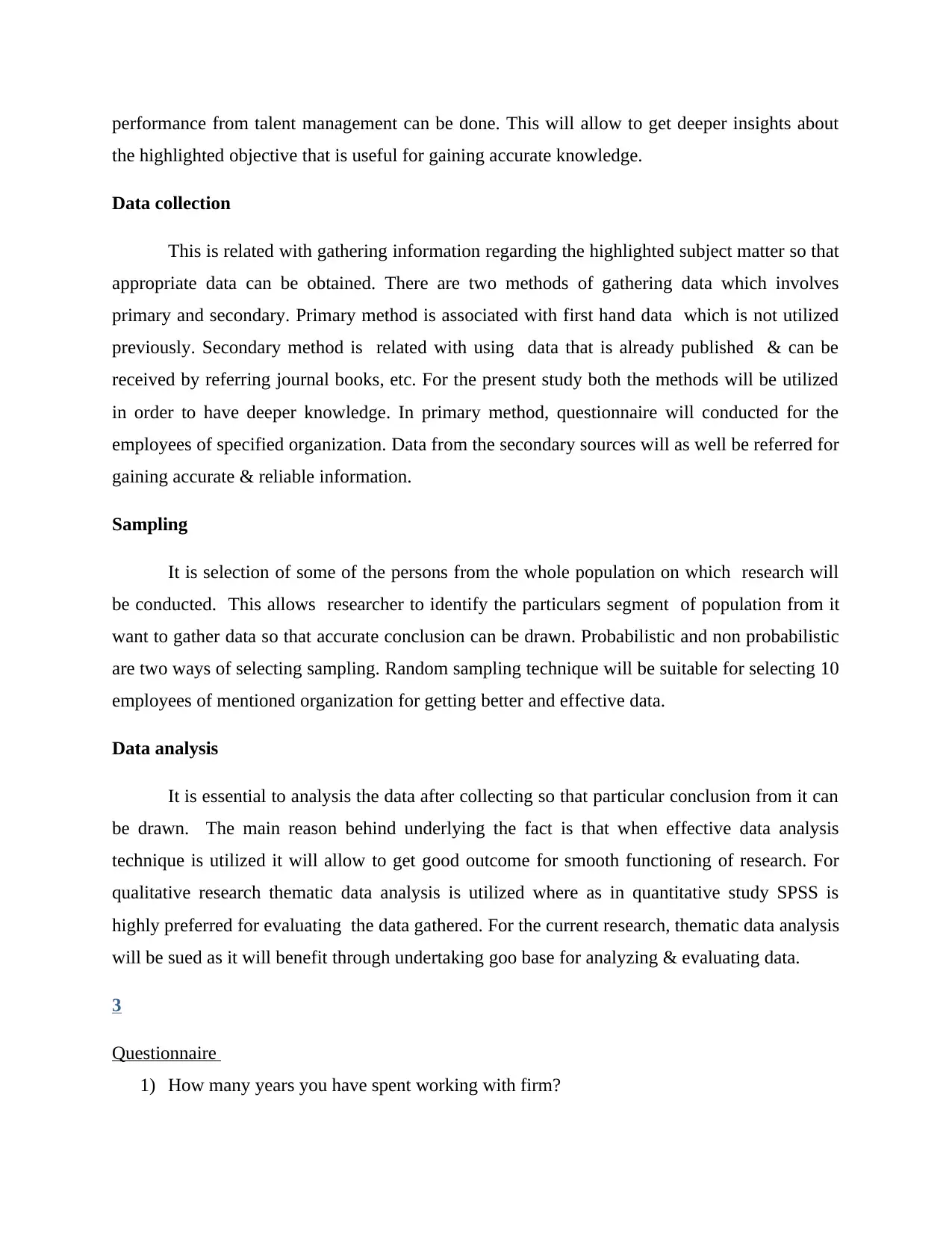
performance from talent management can be done. This will allow to get deeper insights about
the highlighted objective that is useful for gaining accurate knowledge.
Data collection
This is related with gathering information regarding the highlighted subject matter so that
appropriate data can be obtained. There are two methods of gathering data which involves
primary and secondary. Primary method is associated with first hand data which is not utilized
previously. Secondary method is related with using data that is already published & can be
received by referring journal books, etc. For the present study both the methods will be utilized
in order to have deeper knowledge. In primary method, questionnaire will conducted for the
employees of specified organization. Data from the secondary sources will as well be referred for
gaining accurate & reliable information.
Sampling
It is selection of some of the persons from the whole population on which research will
be conducted. This allows researcher to identify the particulars segment of population from it
want to gather data so that accurate conclusion can be drawn. Probabilistic and non probabilistic
are two ways of selecting sampling. Random sampling technique will be suitable for selecting 10
employees of mentioned organization for getting better and effective data.
Data analysis
It is essential to analysis the data after collecting so that particular conclusion from it can
be drawn. The main reason behind underlying the fact is that when effective data analysis
technique is utilized it will allow to get good outcome for smooth functioning of research. For
qualitative research thematic data analysis is utilized where as in quantitative study SPSS is
highly preferred for evaluating the data gathered. For the current research, thematic data analysis
will be sued as it will benefit through undertaking goo base for analyzing & evaluating data.
3
Questionnaire
1) How many years you have spent working with firm?
the highlighted objective that is useful for gaining accurate knowledge.
Data collection
This is related with gathering information regarding the highlighted subject matter so that
appropriate data can be obtained. There are two methods of gathering data which involves
primary and secondary. Primary method is associated with first hand data which is not utilized
previously. Secondary method is related with using data that is already published & can be
received by referring journal books, etc. For the present study both the methods will be utilized
in order to have deeper knowledge. In primary method, questionnaire will conducted for the
employees of specified organization. Data from the secondary sources will as well be referred for
gaining accurate & reliable information.
Sampling
It is selection of some of the persons from the whole population on which research will
be conducted. This allows researcher to identify the particulars segment of population from it
want to gather data so that accurate conclusion can be drawn. Probabilistic and non probabilistic
are two ways of selecting sampling. Random sampling technique will be suitable for selecting 10
employees of mentioned organization for getting better and effective data.
Data analysis
It is essential to analysis the data after collecting so that particular conclusion from it can
be drawn. The main reason behind underlying the fact is that when effective data analysis
technique is utilized it will allow to get good outcome for smooth functioning of research. For
qualitative research thematic data analysis is utilized where as in quantitative study SPSS is
highly preferred for evaluating the data gathered. For the current research, thematic data analysis
will be sued as it will benefit through undertaking goo base for analyzing & evaluating data.
3
Questionnaire
1) How many years you have spent working with firm?
⊘ This is a preview!⊘
Do you want full access?
Subscribe today to unlock all pages.

Trusted by 1+ million students worldwide
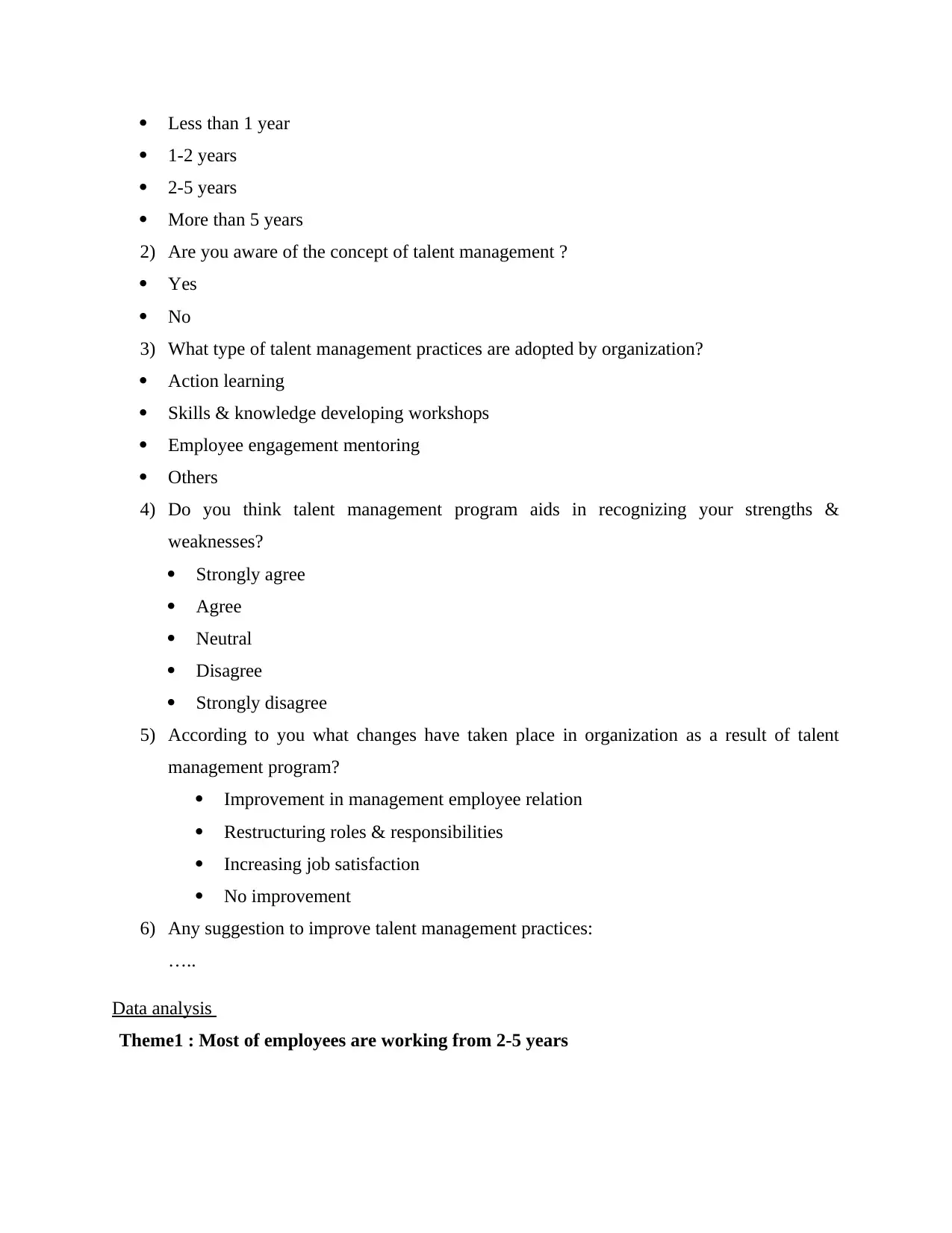
Less than 1 year
1-2 years
2-5 years
More than 5 years
2) Are you aware of the concept of talent management ?
Yes
No
3) What type of talent management practices are adopted by organization?
Action learning
Skills & knowledge developing workshops
Employee engagement mentoring
Others
4) Do you think talent management program aids in recognizing your strengths &
weaknesses?
Strongly agree
Agree
Neutral
Disagree
Strongly disagree
5) According to you what changes have taken place in organization as a result of talent
management program?
Improvement in management employee relation
Restructuring roles & responsibilities
Increasing job satisfaction
No improvement
6) Any suggestion to improve talent management practices:
…..
Data analysis
Theme1 : Most of employees are working from 2-5 years
1-2 years
2-5 years
More than 5 years
2) Are you aware of the concept of talent management ?
Yes
No
3) What type of talent management practices are adopted by organization?
Action learning
Skills & knowledge developing workshops
Employee engagement mentoring
Others
4) Do you think talent management program aids in recognizing your strengths &
weaknesses?
Strongly agree
Agree
Neutral
Disagree
Strongly disagree
5) According to you what changes have taken place in organization as a result of talent
management program?
Improvement in management employee relation
Restructuring roles & responsibilities
Increasing job satisfaction
No improvement
6) Any suggestion to improve talent management practices:
…..
Data analysis
Theme1 : Most of employees are working from 2-5 years
Paraphrase This Document
Need a fresh take? Get an instant paraphrase of this document with our AI Paraphraser
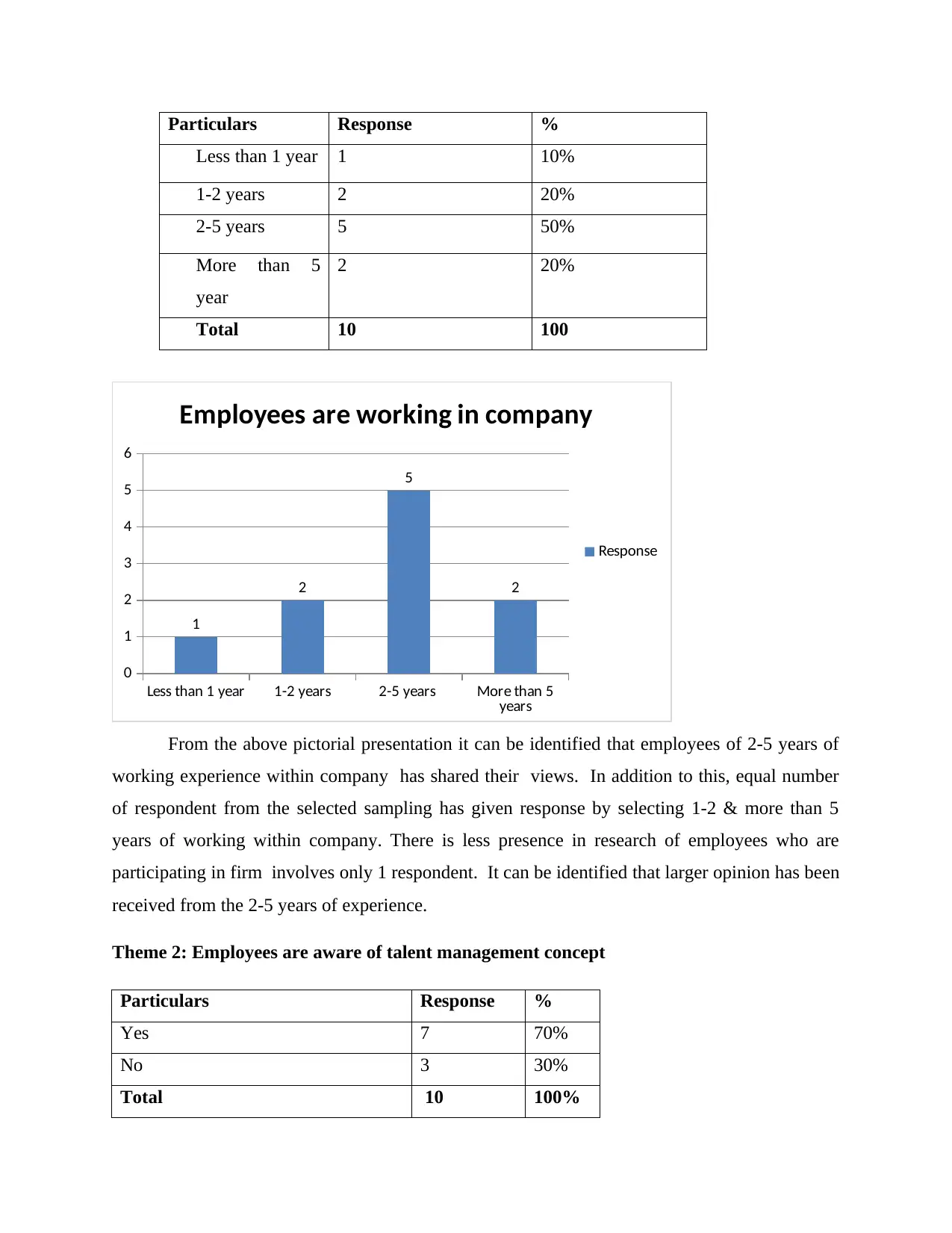
Particulars Response %
Less than 1 year 1 10%
1-2 years 2 20%
2-5 years 5 50%
More than 5
year
2 20%
Total 10 100
Less than 1 year 1-2 years 2-5 years More than 5
years
0
1
2
3
4
5
6
1
2
5
2
Employees are working in company
Response
From the above pictorial presentation it can be identified that employees of 2-5 years of
working experience within company has shared their views. In addition to this, equal number
of respondent from the selected sampling has given response by selecting 1-2 & more than 5
years of working within company. There is less presence in research of employees who are
participating in firm involves only 1 respondent. It can be identified that larger opinion has been
received from the 2-5 years of experience.
Theme 2: Employees are aware of talent management concept
Particulars Response %
Yes 7 70%
No 3 30%
Total 10 100%
Less than 1 year 1 10%
1-2 years 2 20%
2-5 years 5 50%
More than 5
year
2 20%
Total 10 100
Less than 1 year 1-2 years 2-5 years More than 5
years
0
1
2
3
4
5
6
1
2
5
2
Employees are working in company
Response
From the above pictorial presentation it can be identified that employees of 2-5 years of
working experience within company has shared their views. In addition to this, equal number
of respondent from the selected sampling has given response by selecting 1-2 & more than 5
years of working within company. There is less presence in research of employees who are
participating in firm involves only 1 respondent. It can be identified that larger opinion has been
received from the 2-5 years of experience.
Theme 2: Employees are aware of talent management concept
Particulars Response %
Yes 7 70%
No 3 30%
Total 10 100%
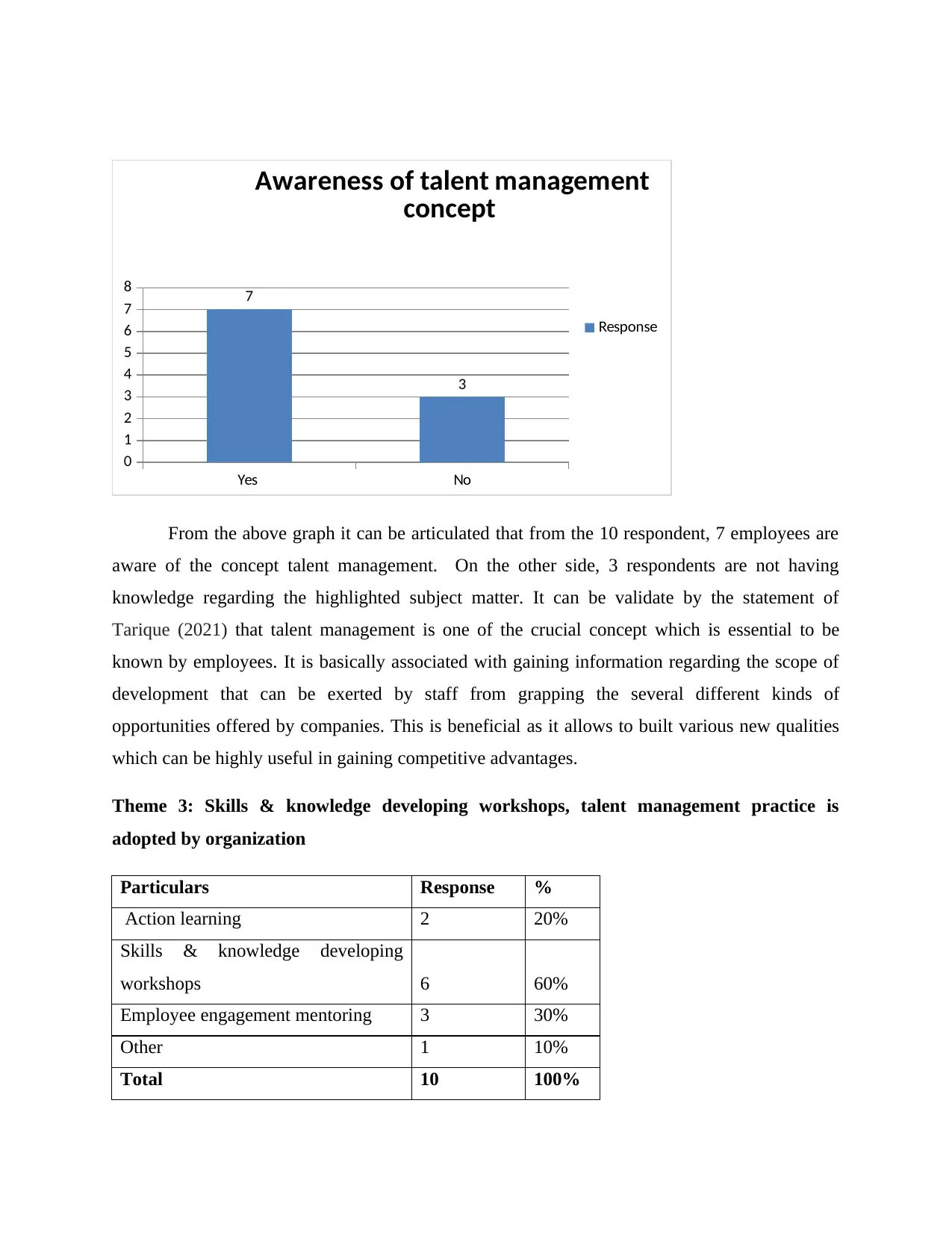
Yes No
0
1
2
3
4
5
6
7
8 7
3
Awareness of talent management
concept
Response
From the above graph it can be articulated that from the 10 respondent, 7 employees are
aware of the concept talent management. On the other side, 3 respondents are not having
knowledge regarding the highlighted subject matter. It can be validate by the statement of
Tarique (2021) that talent management is one of the crucial concept which is essential to be
known by employees. It is basically associated with gaining information regarding the scope of
development that can be exerted by staff from grapping the several different kinds of
opportunities offered by companies. This is beneficial as it allows to built various new qualities
which can be highly useful in gaining competitive advantages.
Theme 3: Skills & knowledge developing workshops, talent management practice is
adopted by organization
Particulars Response %
Action learning 2 20%
Skills & knowledge developing
workshops 6 60%
Employee engagement mentoring 3 30%
Other 1 10%
Total 10 100%
0
1
2
3
4
5
6
7
8 7
3
Awareness of talent management
concept
Response
From the above graph it can be articulated that from the 10 respondent, 7 employees are
aware of the concept talent management. On the other side, 3 respondents are not having
knowledge regarding the highlighted subject matter. It can be validate by the statement of
Tarique (2021) that talent management is one of the crucial concept which is essential to be
known by employees. It is basically associated with gaining information regarding the scope of
development that can be exerted by staff from grapping the several different kinds of
opportunities offered by companies. This is beneficial as it allows to built various new qualities
which can be highly useful in gaining competitive advantages.
Theme 3: Skills & knowledge developing workshops, talent management practice is
adopted by organization
Particulars Response %
Action learning 2 20%
Skills & knowledge developing
workshops 6 60%
Employee engagement mentoring 3 30%
Other 1 10%
Total 10 100%
⊘ This is a preview!⊘
Do you want full access?
Subscribe today to unlock all pages.

Trusted by 1+ million students worldwide
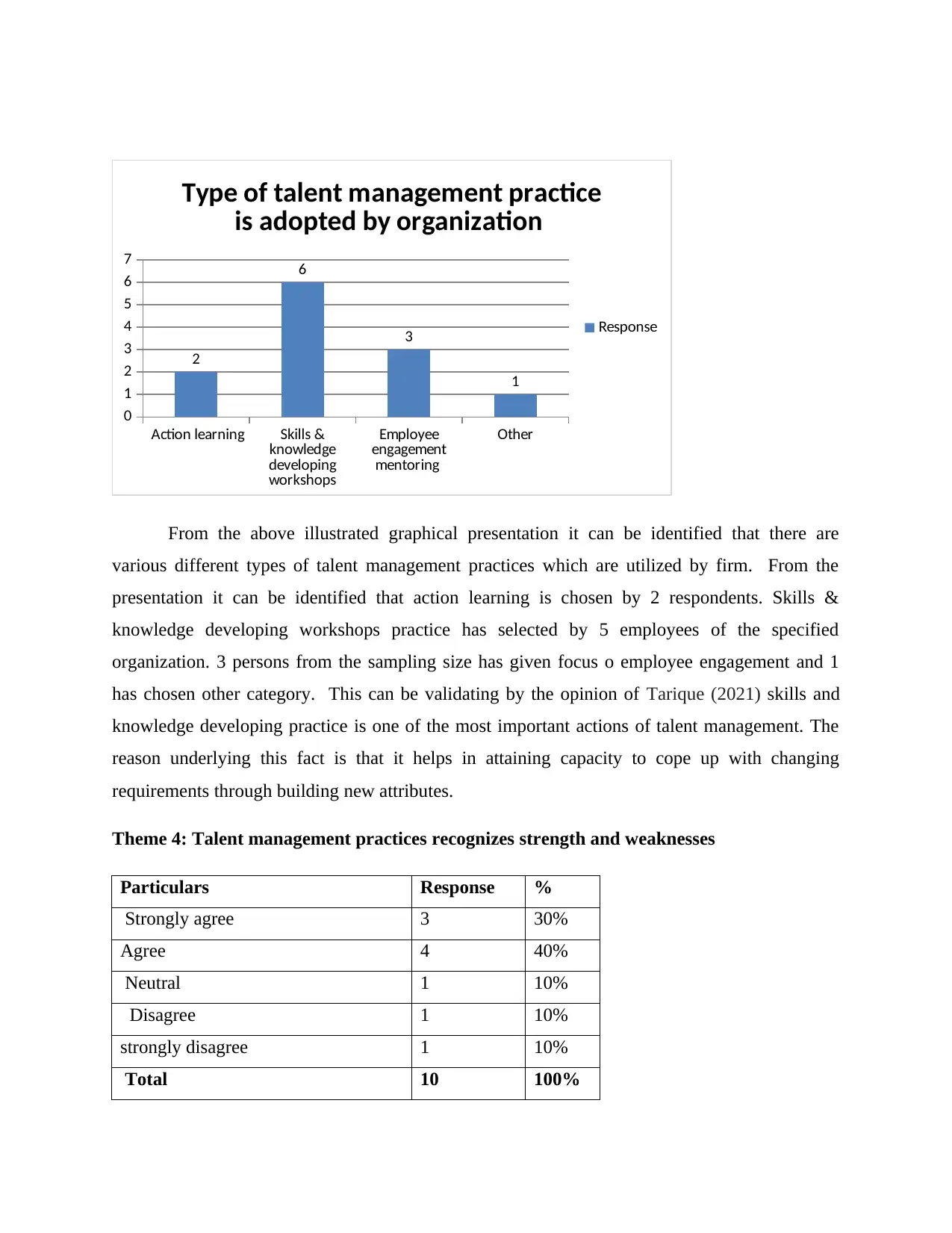
Action learning Skills &
knowledge
developing
workshops
Employee
engagement
mentoring
Other
0
1
2
3
4
5
6
7
2
6
3
1
Type of talent management practice
is adopted by organization
Response
From the above illustrated graphical presentation it can be identified that there are
various different types of talent management practices which are utilized by firm. From the
presentation it can be identified that action learning is chosen by 2 respondents. Skills &
knowledge developing workshops practice has selected by 5 employees of the specified
organization. 3 persons from the sampling size has given focus o employee engagement and 1
has chosen other category. This can be validating by the opinion of Tarique (2021) skills and
knowledge developing practice is one of the most important actions of talent management. The
reason underlying this fact is that it helps in attaining capacity to cope up with changing
requirements through building new attributes.
Theme 4: Talent management practices recognizes strength and weaknesses
Particulars Response %
Strongly agree 3 30%
Agree 4 40%
Neutral 1 10%
Disagree 1 10%
strongly disagree 1 10%
Total 10 100%
knowledge
developing
workshops
Employee
engagement
mentoring
Other
0
1
2
3
4
5
6
7
2
6
3
1
Type of talent management practice
is adopted by organization
Response
From the above illustrated graphical presentation it can be identified that there are
various different types of talent management practices which are utilized by firm. From the
presentation it can be identified that action learning is chosen by 2 respondents. Skills &
knowledge developing workshops practice has selected by 5 employees of the specified
organization. 3 persons from the sampling size has given focus o employee engagement and 1
has chosen other category. This can be validating by the opinion of Tarique (2021) skills and
knowledge developing practice is one of the most important actions of talent management. The
reason underlying this fact is that it helps in attaining capacity to cope up with changing
requirements through building new attributes.
Theme 4: Talent management practices recognizes strength and weaknesses
Particulars Response %
Strongly agree 3 30%
Agree 4 40%
Neutral 1 10%
Disagree 1 10%
strongly disagree 1 10%
Total 10 100%
Paraphrase This Document
Need a fresh take? Get an instant paraphrase of this document with our AI Paraphraser
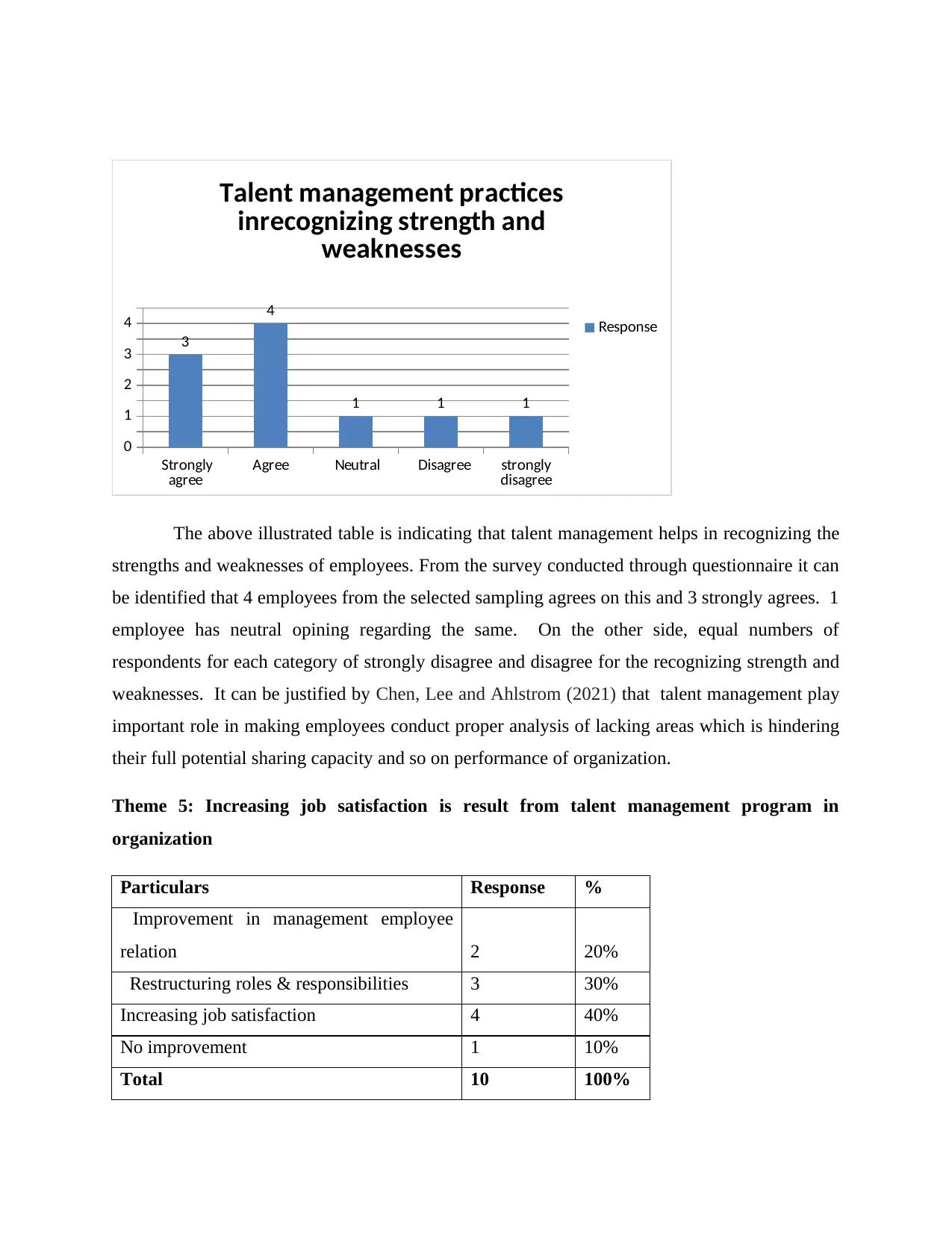
Strongly
agree Agree Neutral Disagree strongly
disagree
0
1
2
3
4
3
4
1 1 1
Talent management practices
inrecognizing strength and
weaknesses
Response
The above illustrated table is indicating that talent management helps in recognizing the
strengths and weaknesses of employees. From the survey conducted through questionnaire it can
be identified that 4 employees from the selected sampling agrees on this and 3 strongly agrees. 1
employee has neutral opining regarding the same. On the other side, equal numbers of
respondents for each category of strongly disagree and disagree for the recognizing strength and
weaknesses. It can be justified by Chen, Lee and Ahlstrom (2021) that talent management play
important role in making employees conduct proper analysis of lacking areas which is hindering
their full potential sharing capacity and so on performance of organization.
Theme 5: Increasing job satisfaction is result from talent management program in
organization
Particulars Response %
Improvement in management employee
relation 2 20%
Restructuring roles & responsibilities 3 30%
Increasing job satisfaction 4 40%
No improvement 1 10%
Total 10 100%
agree Agree Neutral Disagree strongly
disagree
0
1
2
3
4
3
4
1 1 1
Talent management practices
inrecognizing strength and
weaknesses
Response
The above illustrated table is indicating that talent management helps in recognizing the
strengths and weaknesses of employees. From the survey conducted through questionnaire it can
be identified that 4 employees from the selected sampling agrees on this and 3 strongly agrees. 1
employee has neutral opining regarding the same. On the other side, equal numbers of
respondents for each category of strongly disagree and disagree for the recognizing strength and
weaknesses. It can be justified by Chen, Lee and Ahlstrom (2021) that talent management play
important role in making employees conduct proper analysis of lacking areas which is hindering
their full potential sharing capacity and so on performance of organization.
Theme 5: Increasing job satisfaction is result from talent management program in
organization
Particulars Response %
Improvement in management employee
relation 2 20%
Restructuring roles & responsibilities 3 30%
Increasing job satisfaction 4 40%
No improvement 1 10%
Total 10 100%
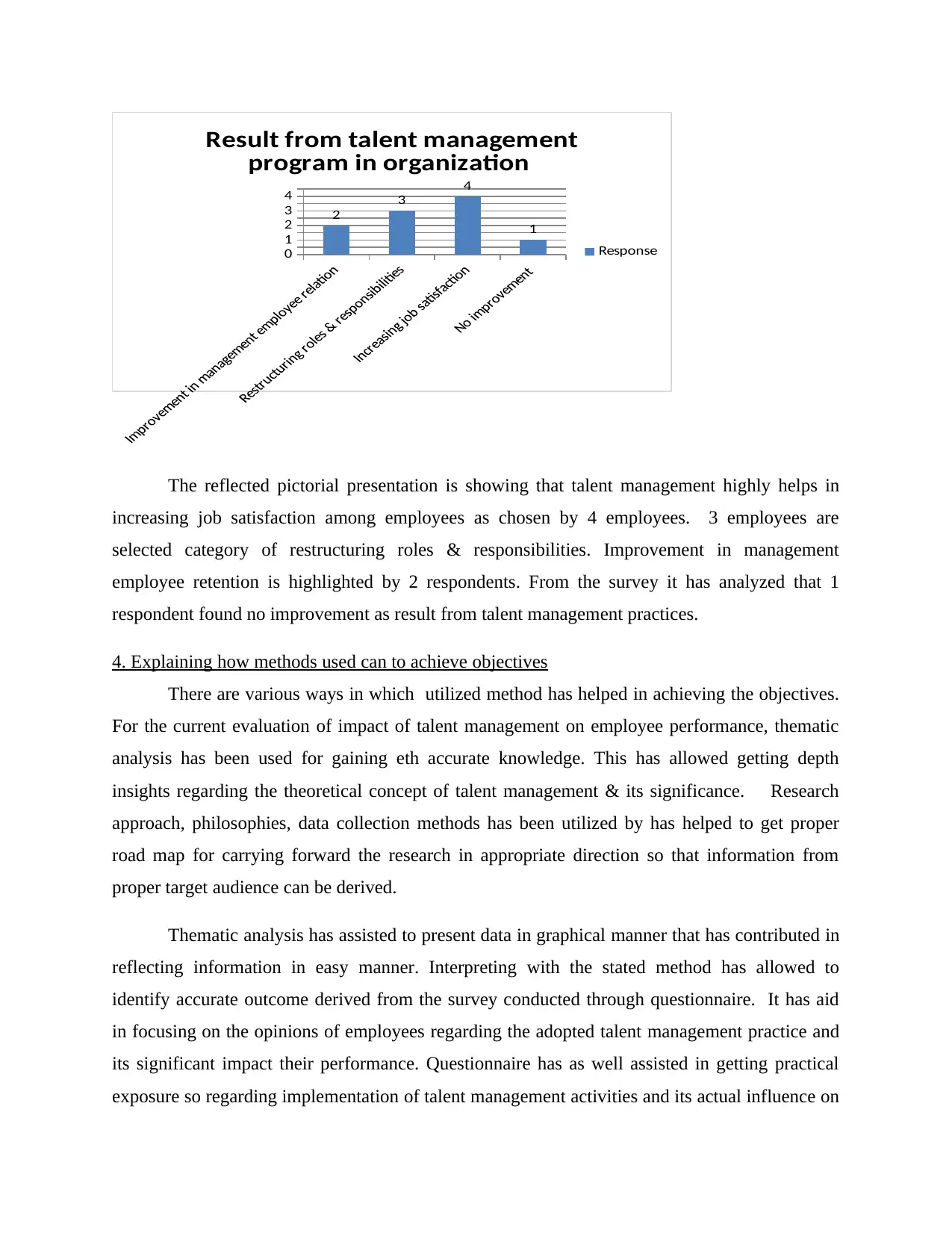
0
1
2
3
4
2
3
4
1
Result from talent management
program in organization
Response
The reflected pictorial presentation is showing that talent management highly helps in
increasing job satisfaction among employees as chosen by 4 employees. 3 employees are
selected category of restructuring roles & responsibilities. Improvement in management
employee retention is highlighted by 2 respondents. From the survey it has analyzed that 1
respondent found no improvement as result from talent management practices.
4. Explaining how methods used can to achieve objectives
There are various ways in which utilized method has helped in achieving the objectives.
For the current evaluation of impact of talent management on employee performance, thematic
analysis has been used for gaining eth accurate knowledge. This has allowed getting depth
insights regarding the theoretical concept of talent management & its significance. Research
approach, philosophies, data collection methods has been utilized by has helped to get proper
road map for carrying forward the research in appropriate direction so that information from
proper target audience can be derived.
Thematic analysis has assisted to present data in graphical manner that has contributed in
reflecting information in easy manner. Interpreting with the stated method has allowed to
identify accurate outcome derived from the survey conducted through questionnaire. It has aid
in focusing on the opinions of employees regarding the adopted talent management practice and
its significant impact their performance. Questionnaire has as well assisted in getting practical
exposure so regarding implementation of talent management activities and its actual influence on
1
2
3
4
2
3
4
1
Result from talent management
program in organization
Response
The reflected pictorial presentation is showing that talent management highly helps in
increasing job satisfaction among employees as chosen by 4 employees. 3 employees are
selected category of restructuring roles & responsibilities. Improvement in management
employee retention is highlighted by 2 respondents. From the survey it has analyzed that 1
respondent found no improvement as result from talent management practices.
4. Explaining how methods used can to achieve objectives
There are various ways in which utilized method has helped in achieving the objectives.
For the current evaluation of impact of talent management on employee performance, thematic
analysis has been used for gaining eth accurate knowledge. This has allowed getting depth
insights regarding the theoretical concept of talent management & its significance. Research
approach, philosophies, data collection methods has been utilized by has helped to get proper
road map for carrying forward the research in appropriate direction so that information from
proper target audience can be derived.
Thematic analysis has assisted to present data in graphical manner that has contributed in
reflecting information in easy manner. Interpreting with the stated method has allowed to
identify accurate outcome derived from the survey conducted through questionnaire. It has aid
in focusing on the opinions of employees regarding the adopted talent management practice and
its significant impact their performance. Questionnaire has as well assisted in getting practical
exposure so regarding implementation of talent management activities and its actual influence on
⊘ This is a preview!⊘
Do you want full access?
Subscribe today to unlock all pages.

Trusted by 1+ million students worldwide
1 out of 14
Related Documents
Your All-in-One AI-Powered Toolkit for Academic Success.
+13062052269
info@desklib.com
Available 24*7 on WhatsApp / Email
![[object Object]](/_next/static/media/star-bottom.7253800d.svg)
Unlock your academic potential
Copyright © 2020–2026 A2Z Services. All Rights Reserved. Developed and managed by ZUCOL.



